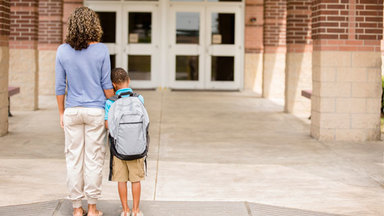 Every summer, about two weeks before the beginning of school, my phone lights up at an alarming rate. With staggered start dates around the country, the concerns about back-to-school anxiety come in waves and continue through most of the fall. Good news: you’re not alone. Take a second grade boy, for example. He loved kindergarten. He liked first grade. Just weeks before the first day of second grade, he declared that he had no intention of going to school anymore. At first, his parents thought it was cute and funny. Most kids would choose endless summer over homework and sitting still all day, after all. Within days of this declaration, however, his behavior changed. He woke up with nightmares almost every night. His appetite decreased. He stopped doing the fun things he normally enjoyed, like running through the sprinkler with his sister and practicing soccer kicks in the yard. He became clingy, he whined a lot and he was irritable more often than not. He was anxious. Feelings of anxiety are perfectly normal and to be expected during times of transition. While many people think of separation anxiety as a problem confined to toddlers and preschoolers, I also see it in elementary and middle school kids. And back-to-school anxiety can occur clear through high school! Some kids are more hard-wired for anxious thoughts and feelings than others. While some level of anxiety affects most people, high levels of anxiety can be disruptive to both the child and the whole family. Know the Signs Some worries are to be expected. It’s not easy to walk into a new classroom with a new teacher and start from scratch every single year. Watch for these sneaky symptoms of anxiety as the new school year begins:
How to Deal with Back-to-School Anxiety Consistency and routines are always a great place to start when it comes to squashing those back-to-school worries! Try some of these strategies to help your child ease into the new school year: Attend school (and be early!). While it’s perfectly normal to have worries when starting a new school year, it’s very important to attend school each day. A huge meltdown might have you wondering if you should simply try another day, but avoidance of school will only increase and reinforce your child’s anxiety. Missing school because of anxiety robs your child of the chance to gain mastery, make friends, enjoy a successful school day and develop a relationship with the teacher. Get back to basics. It’s very difficult to feel calm, confident and in control when you are starving or exhausted. Anxiety can cause kids to struggle with sleep and eat a little less. This means that parents have to stay on top of those childhood basics. Set an earlier bedtime for the entire family, make sure each day includes plenty of downtime, and provide balanced meals and nutritious snacks with plenty of time to eat. Eating on the run is stressful for kids. Allow extra time in the mornings. Anxious children don’t like to be late, nor do they enjoy being rushed. Now that you’ve pushed that bedtime up, your child should be able to wake with plenty of time to eat, get dressed and get ready for the day. Create healthy nighttime routines to make the mornings easier. Choosing clothes at night, packing snacks and filling water bottles and packing the backpack and placing it by the door are all time savers for anxious kids. Avoid blanket statements. When kids express worries about school, it’s tempting to respond with generic statements such as, “Don’t worry about it!” or “You’ll love it!” These statements rarely provide reassurance for worriers. A better tactic is to address specific worries with your child. When parents take the time to listen and help children come up with strategies to solve problems, kids feel more confident. If your child is worried about where to sit at lunch, for example, have him draw a map of the lunchroom and discuss possibilities. Role-play. The best way to gain mastery over worries is to practice taking control of worrisome situations. Have your child create a list of school-related worries and act out different ways to solve the problems. I like to have kids try out two or three solutions per problem so that they always have a back-up plan. Watch your words. Kids look to their parents for clues. If you appear overwhelmed and anxious on the first day of school, your child is likely to follow your lead. It’s perfectly natural for parents to have worries at the beginning of the school year. Instead of hyper-focusing on the potential negatives or faking it, take the time to talk about feelings and worries as a family. When families work through their feelings together, they empower one another. Back-to-school anxiety can be stressful for families. More often than not, the anxiety decreases as the child adjusts to the new school year. If the anxiety persists, seek help. It’s far better to learn to manage anxious feelings than to suffer in silence and struggle through the school year. www.pbs.org/parents/expert-tips-advice/2016/08/cope-back-school-anxiety/
0 Comments
Leave a Reply. |
Dr. BroussardHere you can read the latest information about our practice. Archives
July 2020
Categories
All
|
Dr. Broussard | Counseling Services | Before Scheduling | Counseling Forms | Frequently Asked Questions | Appointments & Locations | News & Blog | Links
Jeremy H. Broussard, PhD, LPC 2009-2019
Last Updated on 01/17/2020

 RSS Feed
RSS Feed